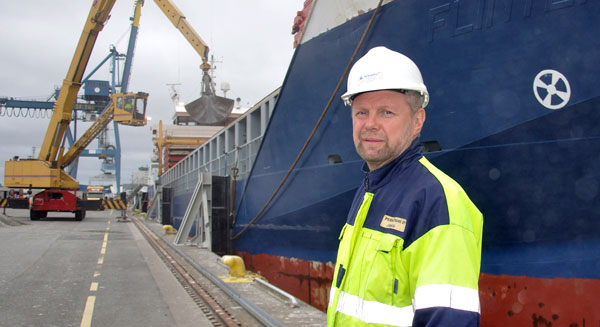Jussi Mälkiä. Photo: Marcus Prest.
Jussi Mälkiä is Managing Director of the family-owned shipping company Meriaura, based in Turku, Finland. From the beginning, Meriaura has aimed at taking environmental issues into consideration in all its activities.
Marcus Prest
According to Mälkiä, there is a risk that the implementation of the Sulphur Directive will have an effect exactly opposite to its general intention within the EU with respect to transportation; that is to say, the directive might result in increased lorry traffic instead of road transportation being transferred to shipping routes.
“What is needed is a holistic solution, with the allowance of enough time to take into consideration the total emissions from traffic, as well as a commitment to rebuilding existing ships and constructing entirely new ships so that they will also comply with future environmental requirements,” says Mälkiä.
“Adapting ships first to the sulphur restrictions, then to future nitrogen restrictions and thereafter to greenhouse gas restrictions is not financially sensible or sustainable.”
Mälkiä says that a lot of time was wasted in arguing about whether the sulphur restrictions were going to be introduced or not, since it was obvious that the directive was going to be accepted. According to him, shipping companies have had far too short an allowance of time to make the necessary changes. The existing exhaust cleaning technology does not work sufficiently well. Nor is there an infrastructure for using gas as fuel; it’s impossible to invest in new ships quickly enough, and there is an insufficient supply of bio-oils or alternative oils.
“This means that the shipping companies must run their fleets on more expensive diesel oil, which is the main reason for increased transport costs.”
Environmental thinking
Meriaura’s largest investment project is the Ecocoaster – the construction of an entirely new type of ship, which will come very close to halving fuel consumption at sea. The Ecocoaster will be run on bio-oil produced by the Meriaura Group.
“Currently it seems that the Ecocoaster will be by far the most energy-efficient vessel with an ice class. This we will achieve partly by a better hull construction, and partly by using hybrid technology in the fuel system. We’ll use a small main engine run on biofuel during normal sailing. In order for the ship to pass through ice, generators are connected to the driving shaft. But the main idea is to use lower power at sea, which in practice means slower speeds.”
A longer time at sea, in turn, requires improved port logistics. Currently Meriaura’s ships spend 45 per cent of their time in ports, and 55 per cent at sea. What is needed is a change resulting in the port time being reduced to 20 per cent and the time at sea increased to 80 per cent. This could partly be achieved by recognising that is it not necessary to sail at full speed; only to queue up at the port. ‘First in, first served’ is currently the rule in ports.
“The queuing system should be improved. And the loading and unloading work in harbours should run around the clock for seven days a week in order to shorten the queues. Or alternatively the ports should have a larger capacity in order to be able to service several ships simultaneously.”
Meriaura’s fleet of fifteen ships sail on the Baltic Sea and in northern Europe. They move between the major ports which function as central points for the global freight shipping, and annually also visit more or less all of the smaller ports of the Bothnian Sea, which provide the national markets with products and through which local products are exported. In total the Meriaura ships transport about two million tons of goods per year.


